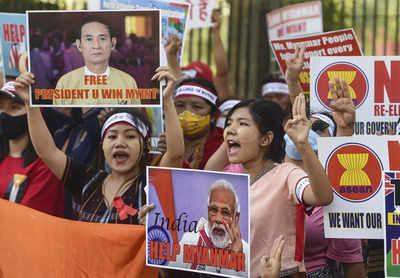[ad_1]

Myanmar refugees raise slogans during a protest at Jantar Mantar in New Delhi (File photo)
UNITED NATIONS: An estimated 4,000 to 6,000 refugees from Myanmar have sought safety in India, a spokesperson for the UN chief has said, as the world body voiced concern over the rising levels of displacement of people since the military coup in the country in February.
The United Nations Refugee Agency (UNHCR) said that in Myanmar, as of last week, approximately 60,700 women, children and men have been internally displaced.
More than 1,700 refugees have crossed into Thailand in March and April, most of whom subsequently returned to Myanmar, and an estimated 4,000 to 6,000 have sought safety in India, Spokesman for the Secretary-General Antonio Guterres, Stephane Dujarric told reporters at the daily press briefing on Wednesday.
Myanmar shares an over 1,600 km long unfenced and porous land border with India as well as a maritime boundary in the Bay of Bengal. Four North-Eastern states – Arunachal Pradesh, Nagaland, Manipur and Mizoram share the international boundary with Myanmar.
The UN team in Myanmar has called on all countries across the region to offer refuge and protection to all people seeking safety, while humanitarian workers should be granted access to help them. UN colleagues again call on the military to refrain from violence and the use of disproportionate use, including the use of live ammunition.
Dujarric said that UN officials in Myanmar are still gravely concerned over rising levels of displacement since the military takeover of the Government on February 1.
“Since then, there has been widespread violence against civilians across the country. Clashes between the Myanmar Armed Forces and ethnic armed organisations in border areas has intensified,” he said.
Last week, a statement issued by the spokesperson for the UN chief had said that 100 days since the Myanmar military takeover that left hundreds of civilians killed and included numerous arbitrary arrests and other human rights violations, the Secretary-General renews his call on the country’s military to respect the will of the people and act in the greater interest of peace and stability in the country.
The Secretary-General also encouraged ASEAN (Association of Southeast Asian Nations) to swiftly follow through on its own commitments, and the international community to support regional efforts, to bring an end to the repression by the military.
Guterres also called on the international community to respond to the increased humanitarian needs.
The Secretary-General’s Special Envoy, Christine Schraner Burgener, was in the region and engaged intensively with a range of key stakeholders, including in light of the broader ramifications of the crisis.
India has condemned the violence in Myanmar and condoled the loss of life, as it urged maximum restraint and called for the release of detained leaders, emphasised the situation to be resolved peacefully and underlined its steadfast commitment to democratic transition.
India has also welcomed the ASEAN Five-point consensus on Myanmar, which calls for an “immediate cessation” of violence in the country and that all parties shall exercise utmost restraint.
The 15-nation UN Security Council had held a private meeting in connection with Myanmar late last month.
India’s Permanent Representative to the UN Ambassador T S Tirumurti had later tweeted that in the Council, he said India welcomes the ASEAN initiative and Five-point consensus. He added that India will strengthen ASEAN’s efforts; the Security Council and the UN “should support their efforts.”
He had added that India continues to “insist on the release of detained leaders and end to violence” and that New Delhi’s overall stand on the situation is consistent.
The ASEAN Five-point consensus states that there shall be an immediate cessation of violence in Myanmar and all parties shall exercise utmost restraint; constructive dialogue among all parties concerned shall commence to seek a peaceful solution in the interests of the people.
It also states that a special envoy of the ASEAN Chair shall facilitate mediation of the dialogue process, with the assistance of the Secretary-General of ASEAN; ASEAN shall provide humanitarian assistance through the AHA Centre (ASEAN Coordinating Centre for Humanitarian Assistance on disaster management) and the special envoy and delegation shall visit Myanmar to meet with all parties concerned.
Schraner Burgener had told the Council in April that the regional security and economic consequences of the situation in Myanmar were getting worse and could deteriorate further.
“The influx of refugees at the Indian and Thai borders and elsewhere is ominous and likely just the beginning,” she had said.
FacebookTwitterLinkedinEMail
[ad_2]
Source link